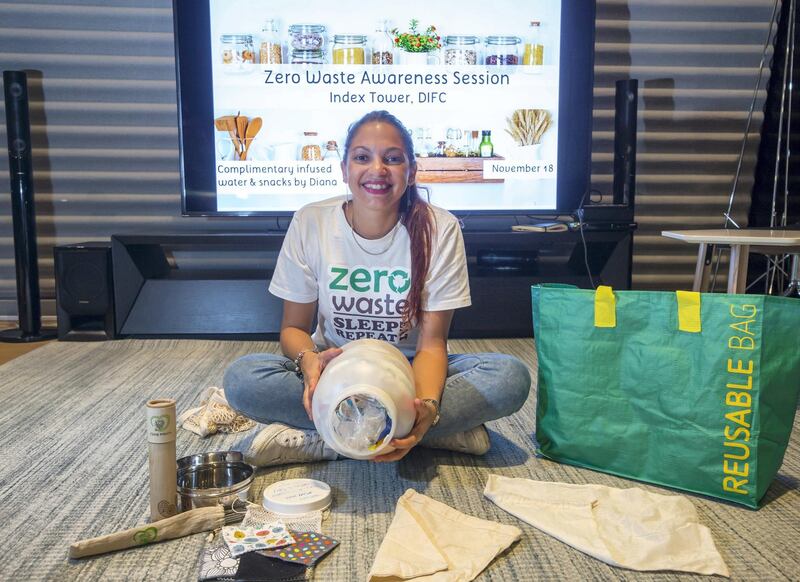A few years ago, Doua Benhida saw a story about a lady who could fit her entire year’s rubbish in an olive jar.
At the time she dismissed it as impossible. Now it is her aim.
“When I saw it I thought, you cannot have all of your waste in just one jar,” said Ms Benhida, 28, who is Moroccan-French and has lived in Dubai for the last two years.
“But then last year I had family over. So you buy more food and shopping, you go out and do picnics. And then it got to me, this is all going to go in the bin.”
That was the start of her drive to become a zero waster. Today, she estimates she is around 70 per cent there.
“I have my resuable bag for grocery shopping. I have my own homemade detergent. I have my coffee mug and straws,” she said.
“I have a bamboo toothbrush. I do my own toothpaste. I use shampoo bars and soap bars as well that are package free.”
But she admits too much waste is still going to the bin. She aims to start composting, which will drastically up her commitment to zero waste.
Ms Benhida has learned a lot about zero wasting over the past year, and she now shares it with others in gatherings in Dubai for friends and others who are interested in the topic.
“What I tell people is you have to identify first is what is your biggest income in the use of plastic? And what is the easiest thing to swap,” she said.
“So for me, it could be the resuable bag. But for someone who drinks coffee ten times a day, it could be a resuable mug. So I just made a list so that people can be aware of the swaps. And it’s great, because a lot of people are not aware that there are shampoo bars which are package free.”
She is part of a growing group of people in the UAE who are going further to reduce their waste.
And there is an industry springing up to support them.
Natalya Konforti, the owner of Glitches and Stitches, a company that aims to help design junkies to become self-sufficient, is running sessions to teach people how to make their own deodorant and toothpaste, skills she learned from a friend who lives in France.
“For the toothpaste I have a bunch of personalisable recipes,” said Ms Konforti, 32, who is French-American.
“So for example, you can use activated charcoal powder if you want a toothpaste that is whitening or you can use calcium carbonate if you have sensitive teeth that you need reinforced. And then it’s actually made with a base of coconut oil because that’s antibacterial.”
Sumithra Vaidyanathan is currently trying to get a company off the ground, selling cleaners made out of fruit and vegetable waste.
First discovered in Thailand, and extensively tested, the products are proven to eradicate germ colonies in tests, said Ms Vaidyanathan, 30, from India and has lived in Dubai for four years. The process was adopted by a group of Indian women who she met when she was travelling a couple of months ago.
“I started making them for myself at home. It was not supposed to be a business. I didn’t think of it that way,” she said.
But she then gave the products to a couple of friends to try, and they were surprised at how well it worked.
“You don’t believe something so simple as a fruit peel or a vegetable peel can help you clean,” said Ms Vaidyanathan.
“I am testing the product just now, and trying to get it tested by the Dubai Municipality.”
___________________
Read more:
Here's how one family has lived a zero waste lifestyle in Dubai
Opinion: Plastic pollution is already a big problem. This year it just got bigger
'We should be ashamed of ourselves': Plastic waste chokes the sea
___________________
Shraddha Shrigondekar, who owns Cling Nature, which sells a range of bamboo produced products, including speakers, straws, plates and toothbrushes which the company produces itself in India, is participating in Ms Benhida’s sessions. She said the concept of zero waste is not widely understood yet here.
“Awareness is something we are creating at the moment,” said Ms Shrigondekar.
But it does already exist, even if the concept is still fairly new in the UAE.
Victoria Vingut and her family reuse whenever they can and try to avoid packaging as much as possible and make their own dishwasher and laundry detergent.
“I compost so I don’t throw away any food scraps, egg boxes etc if I can’t buy eggs loose,” she wrote in a discussion on the topic on the Plastic Free UAE Facebook page.
“We use bamboo toothbrushes and loofah for washing the dishes and in our showers. Both of these then go into my compost bin when worn out,” she said.
Another member of the group said her family is still far from zero waste, but they are making moves towards it.
“Of course we do recycling but also now using cloth reusable shopping bags and fruit and veg bags, cloth diapers for my son, composting on the balcony etc,” she wrote.
“Step by step we are trying to reduce the waste We are making. I have to say it is definitely not easy here in UAE and I have lived much more “zero” waste lifestyle back home. But step by step we can get there.”






